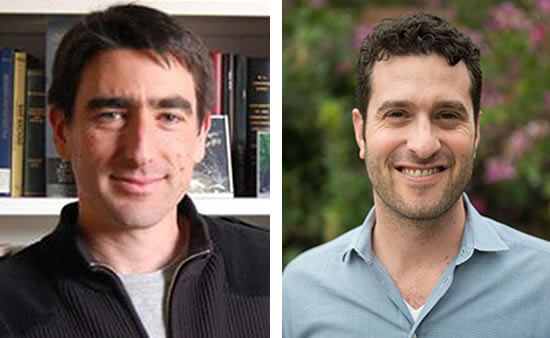
Edge Prize 2017: Stephen J. Collier and Andrew Lakoff
Vital Systems Security: Reflexive Biopolitics and the Government of Emergency, from Theory, Culture & Society, vol. 32, no. 2 (2015), pp. 19-51.
The Edge Prize Committee is pleased to present the award to Stephen J. Collier and Andrew Lakoff for their article, Vital Systems Security: Reflexive Biopolitics and the Government of Emergency, from Theory, Culture & Society, vol. 32, no. 2 (2015), pp. 19-51.
In a piece that seamlessly weaves deep theoretical engagement with rich historical analysis, Collier and Lakoff complicate our understanding of biopolitics as an organizing logic of modernist governance. They demonstrate that the techniques of population management that emerged in the 19th century, such as public health and urban planning, and which have formed the basis of social scientists’ theories of biopolitics, represent but one approach taken by states to securing the health and well-being of their national populations. Alongside these techniques of population security, Collier and Lakoff argue, the 20th century witnessed the emergence of vital systems security, which takes as its object the distributed, sociotechnical systems on which human populations have come to depend and aims at assessing and avoiding unpredictable, episodic threats to these vital infrastructures.
By demonstrating the distinctiveness of vital systems security and its significance in contemporary governance, Collierand Lakoff do more than extend theories of biopolitics–though that in itself would make a significant contribution to the field. They also engage theories of the risk society, showing how the techniques of vital systems security address potentially catastrophic events that exceed traditional forms of risk management. In addition, while adopting a rigorously neutral stance, the authors open up new possibilities for assessing techniques of contemporary governance, especially in times of disaster acute and chronic. Arguing that the notion of the state of exception has been overgeneralized, thereby obfuscating whole realms of expertise and governance, they ask us as researchers to consider instead the ways vital systems security thinking shapes how states exercise power in their normal, and normalized, management of emergencies.
Collier and Lakoff’s paper was selected from among 22 nominees from the journals East Asian Science, Technology and Society: An International Journal, Asian Medicine, Configurations, Social Studies of Science, Science, Technology, & Human Values, Theory, Culture & Society, Kronos: Southern African Histories, Bulletin of the History of Medicine, Journal of the Royal Anthropological Institute, Cities, and Engineering Studies. In evaluating this field of high-quality papers, the committee looked for work that combined empirical data with a clear theoretical framework in a way that reached beyond the boundaries of a particular case to advance thinking in STS.
2017 Edge Prize Committee: Gwen Ottinger, Drexel University, USA (Council Member, chair), Kristoffer Whitney, Rochester Institute of Technology, USA (2016 Winner), and Margarita Rayzberg, Northwestern University, USA (Student Representative to Council)
Acceptance Statement: Stephen J. Collier and Andrew Lakoff
We are honored to accept this year’s David Edge Prize, and grateful to the prize committee for its perceptive and careful reading of our article. It is especially gratifying for our work to be recognized within the field of Science and Technology Studies, which has been a site of continuing inspiration and lively engagement for us. Our article was the product of a lengthy process of collaborative research and writing, and we are grateful to a number of colleagues who provided feedback and encouragement along the way. In particular, we would like to thank the editors of the special issue of the journal Theory, Culture and Society in which the article appeared: Pete Adey, Ben Anderson, and Stephen Graham. We are also grateful to the Science, Technology and Society program of the National Science Foundation for its support of our ongoing research on contemporary forms of security.
Bios
Stephen J. Collier is Associate Professor in the Graduate Program in International Affairs at the New School in New York. He has conducted research in Russia, Georgia, and the United States, and has published on a range of topics including post-socialism, neoliberalism, infrastructure, social welfare, planning, and contemporary security. He is author of Post-Soviet Social: Neoliberalism, Social Modernity, Biopolitics (Princeton University Press, 2011), and co-editor of Biosecurity Interventions (Columbia University Press, 2008), and Global Assemblages (Blackwell, 2005). He is completing a book on the government of catastrophes in the United States during the 20th century.
Andrew Lakoff is Professor of Sociology at the University of Southern California. He has conducted research in Argentina, France and the United States, and his areas of interest include the social studies of medicine, the history of the human sciences, and the science and politics of risk. He is the author of Pharmaceutical Reason: Knowledge and Value in Global Psychiatry (Cambridge University Press, 2006) and co-editor of Global Pharmaceuticals: Ethics, Markets, Practices (Duke University Press, 2006) and Biosecurity Interventions (Columbia University Press, 2008). His most recent book is Unprepared: Global Health in a Time of Emergency (University of California Press, 2017).

